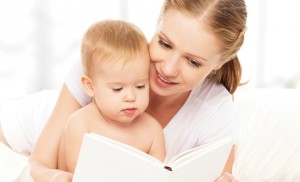The next time you take your baby to his well-child visit, don’t be surprised if your pediatrician hands you a board book. With the release of The American Academy of Pediatric’s (AAP) policy statement promoting reading aloud to infants (it came out last June), the aim is to get parents, kids and books actively engaged.
With the increased recognition that an important part of brain development occurs within the first three years of a child’s life, the AAP’s recommendations add scientific and medical heft to what has, up until now, been more of a “feel-good” message, according to John Hutton, M.D., owner of blue manatee children’s bookstore, and author of the Baby Unplugged series.
“It means that we’ll start to view reading failure as a health problem,” he explains.
Hutton is currently conducting research on literacy in the very young at the Reading and Literacy Discovery Center at Cincinnati Children’s Hospital Medical Center.
He says that the more words infants hear from someone who reads and talks to them consistently, the better their language development and phonological awareness will be. Because the AAP guidelines are a step toward bringing pediatricians into the ongoing conversation of early literacy — and the first time the academy has officially weighed in on early literacy education — your doctor may bring up the value of parents and children reading books together as a catalyst for other developmental milestones.
Read First, Swipe Later
The AAP’s involvement shows good timing: many parents today give their babies smartphones and tablets, allowing them to learn to swipe even before they read … increasing the jeopardy that reading is already in.
“The pivotal thing with the AAP recommendations is that it reinforces the scope of the problem with reading,” says Hutton. “A large part of the population is at risk for reading failure — kids who don’t have access to books or a positive message about reading. The AAP recognizes the need to get back to basics, and the value of unplugging.”
In representing upwards of 62,000 pediatricians across the country, the AAP hopes that by encouraging parents to read early and often to their babies they may save them a lot of trouble later on when the struggles of remediation set in.
By aiming to make reading together a daily fun family activity from infancy, the hope is that parents will not only enhance their child’s communication abilities, but plant the seed in their kids that reading is good, healthy and absolutely necessary for life-long learning.





